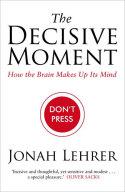Making Our Minds Up

Every day we make thousands of decisions. From figuring out whether to have strawberry or apricot jam on our toast to deliberating whether or not to propose marriage, we shape our lives through the choices we make. How we actually make decisions, the variety of factors brought into play and the sections of the brain that are activated, is a mystery that has preoccupied thinkers since ancient times. Only now, with the incredible strides neuroscience has made in recent years, are we close to reaching a solution to this perennial enigma.
Jonah Lehrer’s new book The Decisive Moment reveals how the mind operates and, more importantly, tells us how to use this knowledge to our advantage. Lehrer’s accomplishments are enough to make one fizz with envy. Not yet thirty, he has been a Rhodes Scholar, worked with a Nobel-Prize winning scientist, edited the highly acclaimed science magazine Seed and published the bestselling book, Proust Was a Neuroscientist. This might imply that The Decisive Moment is a book only for intellectual heavyweights, but Lehrer’s light, agile prose allows him to explain the hidden workings of the brain with the utmost clarity.
The main thrust of Lehrer’s argument involves the demolition of one of the oldest myths in Western thought. Ever since Plato came up with his famous description of the mind as a charioteer trying to control two horses, one calm and obedient, the other wild and impetuous, philosophers have seen consciousness as a duality in which the opposing forces of reason and emotion co-exist. Immanuel Kant even argued that a moral society must be one in which the dictates of reason, and only reason, are obeyed. The problem with these theories is that their view of human nature is mistaken.
Jonah Lehrer claims that the rational and emotional centres of the brain work together when we make life’s big decisions. Reason is not a brilliant Apollonian light obscured by base, Dionysian emotional desires. On the contrary, decision-making begins and ends with emotion. Our feelings create mental patterns that allow us to process vast amounts of information in virtually no time. Without emotion, a purely rational person would spend their life unable to choose between countless possibilities. As David Hume said, “ Reason is the Slave of the Passions.”
The great question remains, when should we take a rational approach to a decision and when should we take an emotional one? In answer Lehrer unveils a series of expertly chosen case-studies, including stories of plane-crashes and poker games, war zones and financial meltdowns, shopping sprees and soap operas, in which we see the emotional and rational brains of a variety of people in action. Each of these illustrates a different decision-making method, examining everything from the mind’s potential to come up with a spontaneous solution to an unprecedented crisis to its ability to make huge choices based only on gut instinct.
Lehrer’s findings also go a long way to explain the current economic recession. The fallibility of the emotional brain is clear in the case of the millions of Americans who took out disastrous ‘2/28’ subprime mortgages simply because the low, fixed-interest rate of the first two years made them forget the much higher, adjustable rate of the following 28. America’s enormous credit card debt (nearly $20 billion is paid in penalties alone each year) also results from the emotional brain’s capacity to delude itself and simply ignore the unpleasant aspects of life. Also, Lehrer insists that in a boom people are inclined to risk more and more in an instance of what psychologists call loss aversion. Fearing that they are missing out on huge profits they turn a blind eye to their losses until it is too late.
As a rebuttal of the beliefs of self-interest theory promoters, Lehrer argues that morality is not a flawed concept but a way of life that is hard-wired into the brain. We have an in-built emotional mirror that makes us see the world from the viewpoint of others. Our actions are guided by sympathetic moral intuitions and we have a natural tendency towards fairness and altruism. Neuroscience has found that the only people who do not think this way are psychopaths. Adam Smith was correct. Fellow-feeling is what makes civil society possible.
Above all, Lehrer believes that evolution has provided humanity with one all-important gift, the ability to think about our decisions. Unlike any other animal, we can reflect on our actions and see how we could have chosen better. Whether we want to become an opera singer or a chess grandmaster, the secret of success lies in our ceaseless ability to adapt, to learn from our mistakes. Without this we would be doomed to repeat an unending cycle of failure.
The Decisive Moment is a highly approachable book and Lehrer’s boundless enthusiasm for his subject cannot help but leave you with a renewed appreciation of that most incredible wonder, the human mind. There is not one page that does not contain some dumbfounding fact or figure. Destined to become a classic, The Decisive Moment is complex yet captivating, dense yet entertaining. It also manages to be consistently funny. How many books about neuroscience can claim the same?
 The Decisive Moment: How the Brain Makes up it’s Mind by Jonah Lehrer
The Decisive Moment: How the Brain Makes up it’s Mind by Jonah Lehrer
Canongate pp 247
EURO 12
